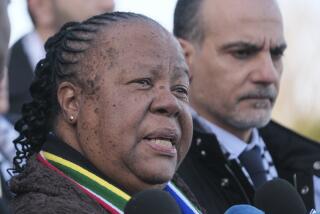Mugabe Vows Full Sanctions on S. Africa
- Share via
HARARE, Zimbabwe — Prime Minister Robert Mugabe said Friday that Zimbabwe will implement a full package of Commonwealth sanctions against South Africa and retaliate against any economic reprisals by Pretoria.
Mugabe told a news conference that the sanctions, agreed to at a Commonwealth mini-summit he attended in London this week, will be implemented by Zimbabwe by the end of the year.
They include a severing of air links, a ban on imports of South African iron, coal and steel and the withdrawal of most consular facilities.
Mugabe lambasted British Prime Minister Margaret Thatcher for her opposition to the sanctions, saying it was racist and based on economic self-interest.
Assessing Slowdown
He said he is still assessing the border slowdown placed by South Africa on Zimbabwean and Zambian goods entering the country this week.
About 85% of Zimbabwe’s trade and 60% of Zambia’s use transport routes through South Africa.
“When an economic war has been declared against you, you accept it as such. You must fight back. All thought about luxury and comfort will have to go. We must just be determined to bear the burden our own way and work out how to counteract the measures taken by South Africa.”
Mugabe said that Zimbabwe would defend itself if South Africa took any military action, such as the raids it carried out against Harare, Lusaka and Gaborone, Botswana, in May.
Asked if he feared that South African troops might invade, he replied: “I can’t rule that out. It’s a mad regime, unpredictable, capable of any evil.”
Buthelezi Attacks Botha
Meanwhile, moderate black leader Chief Mangosuthu Buthelezi told a businessmen’s conference in South Africa’s Natal province that President Pieter W. Botha is taking South Africa into the wilderness.
In an outspoken attack on the country’s white leadership, Buthelezi, one of the few black leaders who has voiced a willingness to negotiate with the government, bitterly criticized Botha’s rejection of British Foreign Secretary Geoffrey Howe’s peace mission last month. Saying that Botha’s action had undermined hopes that he might rise to the occasion, Buthelezi charged that Botha is now seen by the world as “a Third World amateur . . . employing Boer War-style Afrikaner diplomacy.”
“There must come a time when I say enough is enough. There must come a time when the South African government’s actions and attitudes demand that I revise my position before I become an outdated, has-been politician,” he said.
The chief, viewed by many of the 6 million Zulu people as their tribal leader, has been denounced as a collaborator by radical blacks who criticize his moderate stand.
Two More Black Deaths
The Bureau for Information, the sole official source of news on black unrest under the nationwide state of emergency, reported two more black deaths from political violence.
It said one of the two was killed after police fired on a group of about 30 blacks who tried to kidnap a member of the security forces in Kwazakele in the eastern Cape on Thursday.
The death toll under the two-month-old emergency now stands at 220.
In Johannesburg, meanwhile, two of South Africa’s most prominent critics of apartheid, black activist Winnie Mandela and white Parliament member Helen Suzman, were held briefly by soldiers Friday while visiting a Soweto school.
The two women, and nine journalists accompanying them, were released after about 30 minutes.
Suzman, 68, who has joined black leaders in protesting recent deployment of troops at schools, said, “It must be extremely distressing for black students to be confronted at every turn by a man with his finger on the trigger.”
More to Read
Sign up for Essential California
The most important California stories and recommendations in your inbox every morning.
You may occasionally receive promotional content from the Los Angeles Times.










